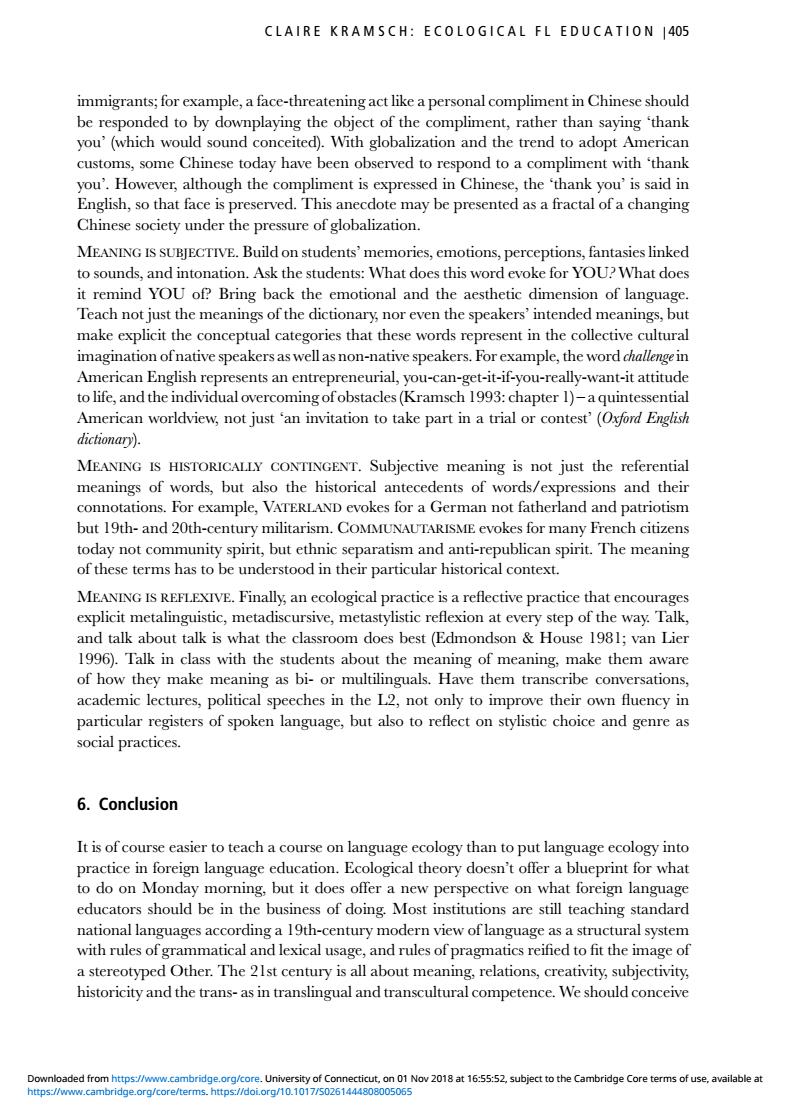正在加载图片...

CLAIRE KRAMSCH:ECOLOGICAL FL EDUCATION 405 immigrants;for example,a face-threatening act like a personal compliment in Chinese should be responded to by downplaying the object of the compliment,rather than saying 'thank you'(which would sound conceited).With globalization and the trend to adopt American customs,some Chinese today have been observed to respond to a compliment with'thank vou'.However.although the compliment is exp essed in Chinese,the 'thank you'is said in English,so that face is preserved.This anccdo may be presented as a fractal of a changing Chinese society under the pressure of globalizatior MEANING IS SUBJECTIVE.Build on students'm notio per tions fantasies linked to soun 1 intonation.Ask the students:What does YOU?What do it remind YOU of?Bring back the emotional and the aesthetic dimension of language Teach not just the meanings of the dictionary,nor even the speakers'intended meanings,but make explicit the conceptual categories that these words represent in the collective cultural imagination ofnative speakers as well as non-native speakers.For example,the word challenge in A ts an entrep u-can eally-want-it attitude stacles(Kramsc 11993: chapter 1)-a quintessentia American worldview,not just 'an invitation to take part in a trial or contest'(Oxford English dictionary). MEANING IS HISTORICALLY CONTINGENT.Subjective meaning is not just the referential meanings of words,but also the historical antecedents of words/expressions and their connotations.For example,VATERLAND evokes for a German not fatherland and patriotism but 19th-and 20th-century militarism.COMMUNAUTARISME evokes for many French citizen today not co unity spir it.but et nti-republican spirit.The meaning MEANING IS REFLEXIVE.Finally,an ecological pra tice is a reflective practice tha t encou explicit metalingu stic,metadiscursive,metastylistic reflexion at every step oft e way.Talk and talk about talk is what the classroom does best (Edmondson House 1981;van Lier 1996).Talk in class with the students about the meaning of meaning,make them aware of how they make meaning as bi-or multilinguals.Have them transcribe conversations, academic lectures,political speeches in the 12,not only to im ove their own fluency in particular registers of spoken language,but also to reflect on stylistic choice and genre as social practices 6.Conclusion It is of course easier to teach a course on language ecology than to put language ecology into practice in foreign language education.Ecological theory doesn't offer a blueprint for what to do on Monday morning,but it does offer a new perspective on what foreign language educators should be in the business of doing Most institutions are still teaching standard national lar guages ace century ew of language al system with rules of gram ical a image o a stereotyped Other.The 21st century is all about meaning,relations,creativity,subjectivity, historicity and the trans-as in translingual and transcultural competence.We should conceive germeog2y80lgtCnetit0m0onNov2018t165s52,subectothecamtbidgecoretermsofuseavalhbleat CLAIRE KRAMSCH: ECOLOGICAL FL EDUCATION 405 immigrants; for example, a face-threatening act like a personal compliment in Chinese should be responded to by downplaying the object of the compliment, rather than saying ‘thank you’ (which would sound conceited). With globalization and the trend to adopt American customs, some Chinese today have been observed to respond to a compliment with ‘thank you’. However, although the compliment is expressed in Chinese, the ‘thank you’ is said in English, so that face is preserved. This anecdote may be presented as a fractal of a changing Chinese society under the pressure of globalization. MEANING IS SUBJECTIVE. Build on students’ memories, emotions, perceptions, fantasies linked to sounds, and intonation. Ask the students: What does this word evoke for YOU? What does it remind YOU of? Bring back the emotional and the aesthetic dimension of language. Teach not just the meanings of the dictionary, nor even the speakers’ intended meanings, but make explicit the conceptual categories that these words represent in the collective cultural imagination of native speakers as well as non-native speakers. For example, the word challenge in American English represents an entrepreneurial, you-can-get-it-if-you-really-want-it attitude to life, and the individual overcoming of obstacles (Kramsch 1993: chapter 1) – a quintessential American worldview, not just ‘an invitation to take part in a trial or contest’ (Oxford English dictionary). MEANING IS HISTORICALLY CONTINGENT. Subjective meaning is not just the referential meanings of words, but also the historical antecedents of words/expressions and their connotations. For example, VATERLAND evokes for a German not fatherland and patriotism but 19th- and 20th-century militarism. COMMUNAUTARISME evokes for many French citizens today not community spirit, but ethnic separatism and anti-republican spirit. The meaning of these terms has to be understood in their particular historical context. MEANING IS REFLEXIVE. Finally, an ecological practice is a reflective practice that encourages explicit metalinguistic, metadiscursive, metastylistic reflexion at every step of the way. Talk, and talk about talk is what the classroom does best (Edmondson & House 1981; van Lier 1996). Talk in class with the students about the meaning of meaning, make them aware of how they make meaning as bi- or multilinguals. Have them transcribe conversations, academic lectures, political speeches in the L2, not only to improve their own fluency in particular registers of spoken language, but also to reflect on stylistic choice and genre as social practices. 6. Conclusion It is of course easier to teach a course on language ecology than to put language ecology into practice in foreign language education. Ecological theory doesn’t offer a blueprint for what to do on Monday morning, but it does offer a new perspective on what foreign language educators should be in the business of doing. Most institutions are still teaching standard national languages according a 19th-century modern view of language as a structural system with rules of grammatical and lexical usage, and rules of pragmatics reified to fit the image of a stereotyped Other. The 21st century is all about meaning, relations, creativity, subjectivity, historicity and the trans- as in translingual and transcultural competence. We should conceive https://www.cambridge.org/core/terms. https://doi.org/10.1017/S0261444808005065 Downloaded from https://www.cambridge.org/core. University of Connecticut, on 01 Nov 2018 at 16:55:52, subject to the Cambridge Core terms of use, available at